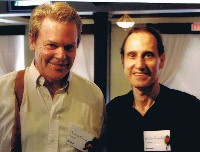|
e-novel idea
Long
before the Net hit mainstream, a Canadian wrote the world’s first electronic
novel. Burke Campbell looks back at his Blind Pharaoh, which some critics called an intriguing ‘stunt’.
They were only half right, the author says.
It was staged for a rising star — information technology.
by
Burke Campbell
Financial Post IT
Monthly:
A Special Report
Date
of Publication: December
20-22, 1997
Subject
of Article: Electronic Novel Event 1982
Fifteen years ago, in the fall of 1982, William French,
then book critic at the Globe and Mail,
surprised his readers when he grandly announced, “Whether Toronto will ...
become the Kitty Hawk of the post-publisher era or merely the scene of a clever
stunt will be a question for future historians to decide.” The ‘stunt’ he
was referring to was my self-staged event:
I intended to write a novel on a computer, distributing it electronically
to computer screens around the globe. My words would fly through cyberspace,
by-passing the traditional middleman, the publisher.
Correctly, French noted in his column that, “Publishers
and booksellers, whose services would be eliminated if computer publishing took
over, don’t seem unduly worried.” Near
the start of the 1980s, most publishers knew nothing about computers and
networks, and did not realize their full potential. The hardware companies that
sold the technology had only a limited idea of how or why their products might
be used. A corporate manager told me bluntly, “So you want to send a book by
e-mail? What’s interesting about
that? Who cares!”
Undaunted, I forged ahead, securing grants, sponsors and making my event
a very public affair.
On November 14, I arrived at an art gallery on Queen Street
in a chauffeur-driven limousine. Surrounded by well-wishers and after several
rounds of champagne, I began writing on an Apple III computer, generously
donated by Apple Canada for the occasion. I
lived well and wrote steadily for three days, at which time the completed
manuscript (titled Blind Pharaoh) was
sent electronically via phone line to Source Telecomputing Corporation, a
databank outside of Washington, D.C. There, the “book” was put online and
made available to Source subscribers world-wide. One of the work’s first
readers was Henry Kisor, the book critic of the Chicago Sun-Times, who wrote, “Blind
Pharaoh was, of course, a stunt — but a surprisingly handsome one,” and
went on to speculate about the new technology and the future of print
publishing. Further, the creation of the “all-electronic novel” triggered a
United Press International story and nabbed coverage in major newspapers and
magazines all around the world. Radio stations called from across the U.S.
requesting interviews with “the electronic author.”
At the time, a few far-sighted publishers felt that
computers would gradually influence their staid industry — over a span of,
say, 50 or 100 years. In fact, the
changes came swiftly, with traditional publishers resisting them even when they
were beneficial. Today, publishers
often blame the rising cost of paper for higher book prices.
Yet closer scrutiny suggests it is their archaic practices that are as
much to blame.
...
cont'd |
As Henry Kisor
observed in 1982, “More and more authors are writing books on computers, using
floppy disks to store their writing. But they must send printed-out manuscripts
to their publishers, most of whom are either too parsimonious or too nervous to
explore the new technology for producing printed volumes, let alone electronic
books. The words on manuscript printouts, already ‘keyed in’ once by their
authors, must be re-keyboarded for setting type and proofread again — a
wasteful process.”
Fifteen years later, publishers still compel writers
through legal contract to provide them a double-spaced, typed manuscript even
when it’s easy to send and revise manuscripts via the Net, saving postage,
time, and labor — not to mention paper. Unrepentantly inefficient, publishers
continue to drive book prices up.
Computer technology influenced publishing by speeding up
the manufacture and distribution of information. Significantly, it also altered
the worth of information being published. New technologies permitted high-speed
calculation, correlation, comparisons, analysis and distribution of all types of
data, increasing the role and value of information in our economy. To maintain
its value, this information had to be continuously updated. This, of course,
spelled trouble for publishers who racked up huge profits making and selling
educational textbooks. Once the shelf-life for information decreased, the
contents of these heavy tomes could be rendered obsolete much more quickly,
wiping out their re-sale value. In some cases, students are turning to the Net
for current information or for documents that can be printed on demand or to
cull contents from a variety of sources. Again, publishers are just now
awakening to this sea change in behavior.
In every form of publishing, whether electronic or
paper-based, technological invention and innovations continues. Books — text
and graphics — can be digitized, sent via the Internet, and printed and bound
on-site, wiping out shipping costs. Further,
with the spread of Net marketing and distribution, book-lovers can order and pay
for titles at Web sites such as Amazon.com. Aspiring and professional writers
can use Authorlink! ( www.authorlink.com ), a U.S. on-line global introduction
service, not only for writers, but for agents, publishers, and producers, too.
But these electronic initiatives are typically led by those outside the
publishing establishment.
Looking back, my 1982 event seems oddly prescient. To me,
however, the future appears more interesting. I’m confident that five years
from now, in 2002, writers will still be writing and people will still be
reading from both screen and page. But by then, I suspect, the traditional
publishing houses will have lost significant market share to other players and
other industries more competent to carry out their functions.
Words haven’t changed, but the ways and means by which
they reach us are strikingly different. Today,
the written word, once anchored to the page, can fly around the world in the
blink of an eye. And no one knows
where its wings will take us.
END |
